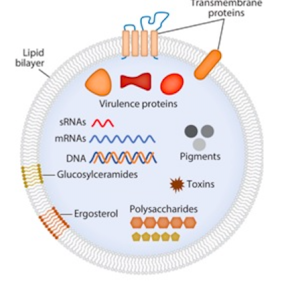 Prelecionista: Deivid Sacon Data: 28/09/2021, às 16h, pelo ZOOM*. Orientador: Sérgio Herminio Brommonschenkel
Prelecionista: Deivid Sacon Data: 28/09/2021, às 16h, pelo ZOOM*. Orientador: Sérgio Herminio Brommonschenkel
Plant pathogens use a variety of strategies to ensure successful infection. Plants respond to infection using an innate two-branched immune system. One uses transmembrane pattern recognition receptors (PRRs). The second, cytoplasmic, uses products of the polymorphic protein NB-LRR. This communication between plant cells and interacting microorganisms requires the secretion and absorption of functional molecules to and from the extracellular environment. In this context, extracellular vesicles act as transport vehicles for small RNAs, proteins and metabolites from the donor to the recipient cells and participate in many cellular processes. In this seminar, an overview of extracellular vesicles in plant-fungi pathogen communication will be addressed, with emphasis on the exchange of cross-kingdom small RNAs between hosts and pathogens to modulate host immunity and pathogen virulence.
*Interessados contatar pos.fitopatologia@ufv.br para solicitar o link.
Fonte das imagens:
Cai, Q. et al. Message in a bubble: shuttling small RNAs and proteins between cells and interacting organisms using extracellular vesicles. Annual Review of Plant Biology, v. 72, p. 497-524, 2021.
Cai, Q. et al. Plant send small RNAs in extracellular vesicles to fungal pathogen to silence virulence genes, Plant Science, v. 360, p. 1126-1129 2018.
Cui, Y. et al. Plant extracellular vesicles. Protoplasma, v. 257, n. 1, p. 3-12, 2020.
